► UK class action on emissions scandal
► 91,000 claimants take mass action
► Plus a recap of what happened in 2015
Mass legal action against Volkswagen’s role in the emissions cheating scandal has begun in the UK, as around 91,000 motorists challenge VW in the High Court. They are banding together to claim compensation for being misled over their vehicles’ emissions – and it’s touted as the largest class action in UK legal history.
Owners of VWs, Audis, Seats and Skodas are trying to sue the car maker three years after the litigtaion was first filed in 2016. Shazia Yamin from the Product Safety and Consumer Law team at law firm Leigh Day said: ‘After four years, I look forward to our clients having their day in court. They believe that Volkswagen not only misled customers but that they also endangered public health with their blatant disregard for safe NOx emission levels and should be held to account.’ VW denies any wrongdoing and intends to defend the action.
A two-week preliminary hearing is now underway at the High Court in London, where Mr Justice Waksman will judge whether the software in UK cars should be classed as a ‘defeat device’ under EU law, as it was in the United States. If he agrees with disgruntled owners, then Volkswagen could be forced to offer compensation to owners here, piling on further pressure to Wolfsburg, which has already spent billions on compensation and fines in the US and other territories.
A spokesperson from VW Group told us: ‘The purpose of the hearing is to determine two specific questions of law, namely whether the English & Welsh High Court is bound by the findings of the German Federal Motor Transport Authority (KBA) or the British Vehicle Certification Agency (VCA), and whether the legal definition under Article 3(10) of Regulation 715/2007/EC of a defeat device is met if certain factors are fulfilled. Volkswagen says the answer to both questions is no.
‘Volkswagen Group continues to defend robustly its position in the High Court in London. It remains Volkswagen Group’s case that the claimants did not suffer any loss at all and that the affected vehicles did not contain a prohibited defeat device. The decision today does not affect any questions of liability or loss.’
We will update this story with news of the case as it unfolds – and this class action could rumble on for two to three years, legal experts predict. Read on for more background about the VW emissions scandal.
Should you still buy a diesel car? We look at the future of derv
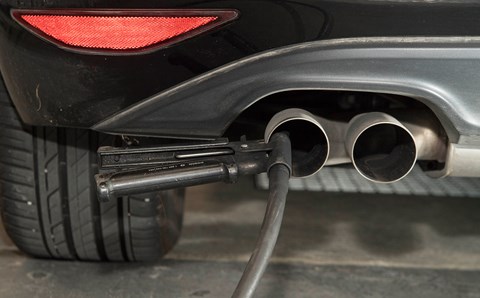
Volkswagen emissions scandal and cheat devices: a quick resumé
The so-called Dieselgate scandal dates back to 2015. VW was found to have systematically cheated emissions tests in the US and Europe by using ‘cheat devices’ in engine ECU controls, so vehicles could detect when they were in a lab and when they were on a real road, trimming exhaust pollution signficantly to score better in tests. Volkswagen has set aside more than €30 billion to pay fines, recalls and other costs arising, forced sweeping changes in its management and realigned its future strategy around electric cars, as it accelerates away from fossil fuels
It’s hard not to underestimate the import of the Dieselgate scandal – it transformed the industrial landscape in Wolfsburg, and arguably boardrooms across the world.
Volkswagen’s ‘defeat device’ was first uncovered by the US Environmental Protection Agency (EPA), which alleged that 3.0-litre diesel engines in some VW, Audi and Porsche cars were fitted with software capping their nitrogen oxide (NOx) emissions during testing – but allowing levels up to nine times greater during ordinary driving.
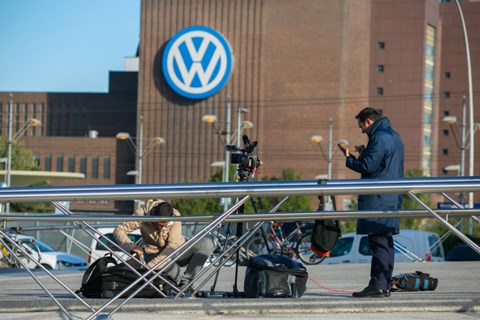
Chaos ensued, and the scandal rapidly went straight to the top of the group – with chairman Martin Winterkorn stepping down in September 2015, along with a variety of notable exeucutives such as engineering chief Ulrich Hackenberg, who masterminded the roll-out of the MQB modular architecture that underpins crucial volume models across VW, Audi, Skoda and Seat.
Lawsuits – civil and criminal – continue to be held in different territories around the world and VW set aside billions in compensation and fines, redrawing the company’s future strategy.
It quickly became clear what effect the new austerity era in Wolfsburg would have: VW pledged that the next-generation Phaeton will switch to become an electric limousine, it fast-tracked hyper-clean diesel technology and it developed a new scalable electric architecture dubbed MEB to underpin a new generation of EVs with projected ranges of between 150-300 miles. The silver lining of this particular cloud is that VW skipped a generation and invested heavily in EVs.
The VW emissions crisis in the UK
The UK boss of Volkswagen, Paul Willis (below), was hauled in front of MPs and admitted that 400,000 British cars would need physical engine modifications to remedy the ‘defeat device’ emissions cheat software. The company started fixing affected cars in January 2016 and said it would take a good year to sort all the cars.
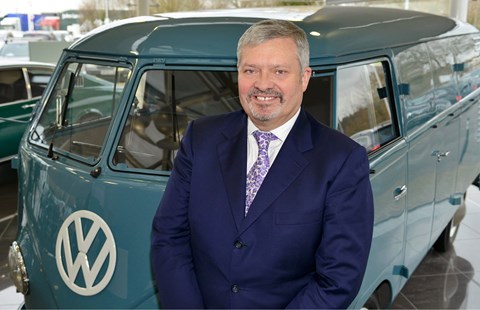
Willis, who has now left his role, was called to appear in front of the transport select committee to explain how VW would restore motorists’ faith in the company’s cars. He admitted that a third of cars affected in the UK would require a change to the fuel injection system – mostly the 1.6 TDI models sold since 2008. It’s a further blow to VW, and confirmation that it’s not just a simple software upgrade.
It has transpired that around 3 million of the 11m cars identified globally could require physical hardware upgrades, as well as a software reflash.
What should happen to my Volkswagen if it was affected by cheat device software?
Officials were keen to stress this was a service action to ‘refit’ cars, not a full recall. It’s a technicality, but full-blown recalls are reserved in the UK for safety-related issues. VW wrote to affected owners and offered a retro-fit upgrade to their diesel car. Owners took their car to a main dealer who offered to upgrade the ECU to eliminate the problem software free of charge. But VW subsequently confirmed that some cars would need additional physical engineering changes as well as a software reflash.
Models affected include all Golf Mk6, Passat Mk7 and Tiguan Mk1 diesels, which were ‘equipped exclusively with type EA189 diesel engines.’ Audis affected included some A1, A3, A4, A5, A6, TT, Q3 and Q5 models, it was confirmed. Skoda and Seat models affected were also based on the group MQB architecture.

The new group boss of Volkswagen certainly had his hands full. Wolfsburg announced sweeping boardroom changes on Friday 25 September 2015: Porsche leader Matthias Mueller (above) was appointed the new CEO of Volkswagen AG and pledged that his first priority was to clean up the company with a major restructure, new personnel and emergency actions to restore faith among the 80 million Volkswagen owners worldwide.
Dr Herbert Diess, CEO of the VW car division, said: ‘We are working at full speed on a technical solution that we will present to partners, to our customers and to the public as swiftly as possible. Our aim is to inform our customers as quickly as possible, so that their vehicles comply fully with regulations. I assure you that Volkswagen will do everything humanly possible to win back the trust of our customers, the dealerships and the public.’
VW emissions scandal: an explainer
The story first broke in the US. Emissions bodies discovered 2.0-litre diesel engines used a hidden special ‘cheat cycle’ when placed on a laboratory testbed (the cars can tell because the front wheels are spinning on a dynometer while the rears are stationary).
A simple recall story in the US rapidly escalated into a full-blown global scandal, with American authorities threatening a robust $18 billion fine, VW shares plummeting by a third, Switzerland banning sales of affected diesels (and Italian VW Group dealers following suit, with an eye on potential recall costs) and Wolfsburg hastily committing to the recall of nearly half a million vehicles in the US, and probably more elsewhere in the world.
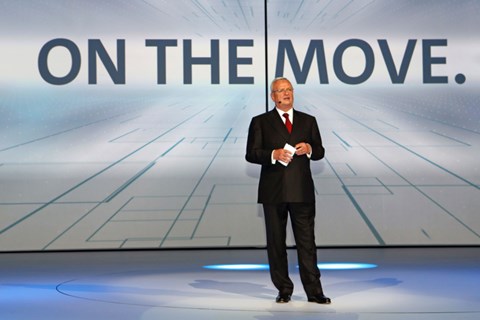
Martin Winterkorn’s resignation statement in full
The boss resigned on Wednesday 23 September 2015. He issued this statement: ‘I am shocked by the events of the past few days. Above all, I am stunned that misconduct on such a scale was possible in the Volkswagen Group. As CEO I accept responsibility for the irregularities that have been found in diesel engines and have therefore requested the Supervisory Board to agree on terminating my function as CEO of the Volkswagen Group. I am doing this in the interests of the company even though I am not aware of any wrong doing on my part. Volkswagen needs a fresh start – also in terms of personnel. I am clearing the way for this fresh start with my resignation. I have always been driven by my desire to serve this company, especially our customers and employees. Volkswagen has been, is and will always be my life. The process of clarification and transparency must continue. This is the only way to win back trust. I am convinced that the Volkswagen Group and its team will overcome this grave crisis.’
A recap: what is VW accused of?
The US Environmental Protection Agency (EPA) and the California Air Resources Board (CARB) found a ‘defeat device’ embedded in the engine management systems on the modern Volkswagen 2.0-litre diesel engine described as EA189, designed to lower exhaust levels of certain pollutants such as nitrogen oxides (NOx) substantially if the car was being emissions tested. When released back to the road, the engine would then pump out normal, higher levels – in tests the EPA found that NOx was 40 times higher when running in normal mode. VW admits ‘while testing diesel cars of the Volkswagen Group they have detected manipulations that violate American environmental standards.’ Volkswagen has now admitted the ‘dual-mode software map’ on affected diesel engines.
What does the EPA say?
‘Put simply, these cars contained software that turns off emissions controls when driving normally and turns them on when the car is undergoing an emissions test,’ said Cynthia Giles, an EPA enforcement officer. ‘We intend to hold Volkswagen responsible. VW was concealing the facts from the EPA, the state of California and from consumers. We expected better from VW. Using a defeat device in cars to evade clean air standards is illegal and a threat to public health.’
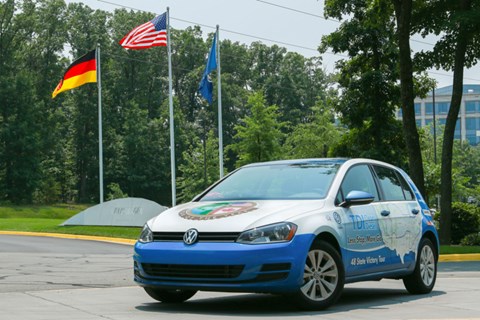
What could happen to Volkswagen now?
The US authorities have the power to levy a fine as high as $37,500 per vehicle affected. Yes, that means a total of $18 billion – in theory. It is thought to be unlikely that the lawyers will be quite as exteme, however, since VW is a smaller player in the States (just 13% of all VW cars sold were in the US in 2014). But make no mistake: this is a serious setback in Wolfsburg’s drive for global domination (in 2015 it became the world’s biggest car making group in the first half) and the scandal now looks set to derail that success. It has already spelled the end of CEO Martin Winterkorn’s leadership in Wolfsburg; his contract was up for renewal this month, and more heads will be likely to roll as independent and external investigations get under way…
Is VW having to recall the cars?
Oh yes. So far VW – and Audi, it should be pointed out – have agreed to recall 482,000 four-cylinder Jettas, Beetles, Golfs, Passats and A3s sold since 2008. It must remove the ‘defeat device’ and clean up the NOx emissions on all the affected cars in the US. That is a seriously expensive recall – never mind the questions whether the same software was fitted to group vehicles sold elsewhere in the world. Volkswagen has subsequently admitted that there are around 11 million products using the 2.0-litre TDI engine globally. And word is that the company may be facing class legal action from US consumers. We sense this is only the tip of the iceberg…
Analysts’ reaction
Respected industry watcher Max Warburton of Bernstein Research says the scandal is a major setback for VW: ‘The commencement of legal proceedings against VW by the US EPA is profoundly serious,’ he said. ‘This is not your usual recall issue, an error in calibration or even a serious safety flaw. All of the former can be attributed to bad luck or bad execution – OEMs can normally claim they were trying their best, but fell short. This is quite different – the accusation is that VW deliberately set out to mislead regulators with a cleverly hidden piece of software.’
Prof Christian Stadler, of Warwick Business School added: ‘No question that this is a big problem for Volkswagen… From 2009 to 2011 Toyota recalled nine million cars for issues leading to unintended acceleration. Estimations suggest that Toyota dealers lost more than $2 billion as a result and the company itself also around $2 billion. Toyota also settled with the government for $1.2 billion. To some extent the cheating by Volkswagen seems more blatant, but the numbers are lower and there are no fatalities involved. This suggests that in the “heat of the moment” the long-term effect on Volkswagen may be overstated. Sure it will hurt, but maybe not quite as bad as we expect right now.’
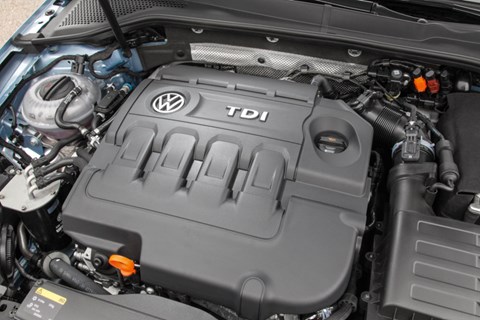
What does Volkswagen say in its defence?
Over to Martin Winterkorn, the former chief executive of Volkswagen AG. ‘The Board of Management at Volkswagen AG takes these findings very seriously,’ he said, shortly before being removed from office. ‘I personally am deeply sorry that we have broken the trust of our customers and the public. We will cooperate fully with the responsible agencies, with transparency and urgency, to clearly, openly, and completely establish all of the facts of this case.Volkswagen has ordered an external investigation of this matter… We at Volkswagen will do everything that must be done in order to re-establish the trust that so many people have placed in us, and we will do everything necessary in order to reverse the damage this has caused.’
The law that VW is deemed to have broken
This is all about section 203 (a) (3) (B) of the Clean Air Act. And we quote: car makers ‘are subject to a civil penalty of up to $3750 for each violation that occurred on or after 13 January 2009. In addition, any manufacturer who, on or after 13 January 2009, sold… any new motor vehicle that was not covered by an EPA-issued COC is subject, among other things, to a civil penalty of up to $37,500 for each violation.’ This is where the $18bn fine threat comes from.
How VW was rumbled
There is a back story here, starting in May 2014 when a study in West Virginia University found conflicting emissions results on a 2012 Jetta and 2013 Passat diesel. They alerted the CARB and EPA – leading to the current scandal. And we fear this one has a long way to run…